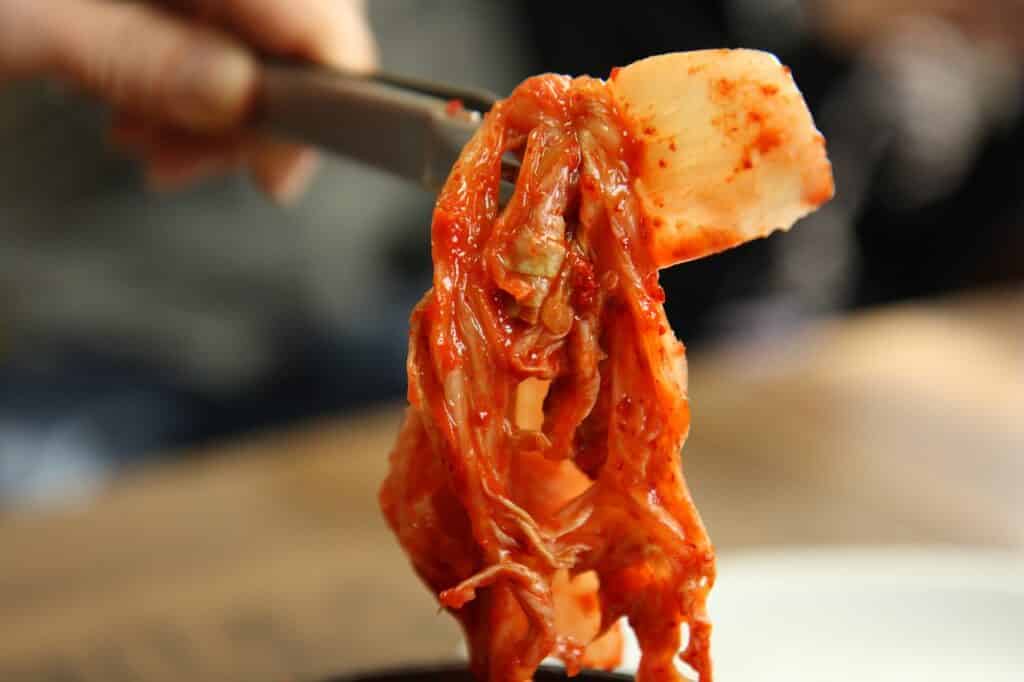The benefits of eating kimchi are endless, as it contains healthy, gut-healing probiotics for your body’s overall wellness.
While kimchi also adds tons of flavor to most dishes we make at home, the question is, is it a suitable treat for your dog?
So, can dogs eat kimchi?
No.
Dogs shouldn’t eat kimchi as it has toxic ingredients like salt, garlic, onions, and red pepper flakes which may be dangerous for dogs, especially if taken in large amounts.
However, if your fido nibbles on a tiny piece, it may not cause him harm.
This article will explain why you shouldn’t feed your dog kimchi.
It will also discuss extensively the health risks it may pose for your dog.

Harmful ingredients in kimchi for dogs
Some kimchi ingredients may not necessarily be fatal to dogs, but they can cause mild to severe symptoms depending on the amount your dog consumes.
These ingredients include:
- Granulated sugar – The sugar content in kimchi may cause your dog to gain unnecessary weight, leading to problems such as diabetes and heart disease. It can also trigger your dog’s blood sugar levels, especially if he’s already diabetic
- Garlic and onion – The kimchi-making process includes garlic and onion to intensify the flavor. Garlic and onions are highly toxic to dogs as they contain chemical compounds that damage the red blood cells. This may result in anemia which can lead to death if left untreated
- Salt – Giving your dog salty foods such as kimchi can result in dehydration or salt poisoning as dogs are susceptible to salt. The high sodium content can cause your dog’s blood pressure to shoot, cardiovascular disease, and an increased risk of stroke
- Red pepper flakes – The capsaicin in red pepper flakes can cause your dog mild to severe digestive issues. They can result in symptoms like diarrhea, stomach discomfort, and gassiness. Spices like red pepper flakes can also lead to excessive thirst, causing your dog to vomit
- Napa cabbage – The napa cabbage used in kimchi preparation may cause digestive issues for your dog if consumed in large amounts. If you feed too much napa cabbage to your dog, he may experience diarrhea, vomiting, or bloating
- Korean radish – While Korean radish may provide certain nutrients for your dog, it may cause gassiness, or GI upset from the fiber, especially when eaten in large amounts
- Korean fish sauce – Fish sauce, including Korean fish sauce, may upset your dog’s stomach causing diarrhea and vomiting. Korean fish sauce is pretty salty and may overwhelm and dehydrate your dog. It also contains glutamate, which is highly toxic for dogs
- Ginger – Like most foods, ginger may not agree with some dogs and can potentially cause stomach upset. In addition, ginger is fibrous, making it hard to digest for your dog, and therefore should only be fed in moderation

Health risks of kimchi in dogs
- Salt toxicity
The most crucial step in making kimchi involves brining the cabbage in salt to dehydrate and season it at an appropriate salinity.
The excess salt used can lead to sodium ion poisoning for your dog.
Your dog may experience vomiting, diarrhea, fever, seizures, and tremors.
To make matters worse, it may even cause death.
- Anemia
All plants in the allium family, including garlic and onions, contain an organosulfur compound that can damage your dog’s red blood cells, overwhelming the cells’ antioxidant properties.
This, in turn, changes the shape of the red blood cells, causing rupture.
When red blood cells rupture, less oxygen is transported to your dog’s tissues, organs, and muscles resulting in anaemia, decreased energy, organ failure, or death.
- Type 2 diabetes
The fermentation process of kimchi requires sugar as an ingredient which can cause more harm than good to your dog’s health.
Too much sugar will not only make your dog overweight, but it can also make him sick.
Sugar may spike your dog’s blood glucose levels leading to insulin resistance.
The pancreas is then forced to produce more insulin to keep your dog’s blood sugar levels stable.
When insulin production becomes excessive, the body stops responding well to insulin, and your dog develops Type 2 diabetes.
- Digestive issues
Too much kimchi can cause digestive issues, including diarrhea, pain, vomiting, and GI distress in dogs.
If these symptoms persist or are left untreated, they can result in dehydration and weakness, which can eventually be life-threatening.
- Dehydration
Kimchi is pickled in salty brine, which can harm your dog.
Too much salt will decrease the amount of water in your dog’s body leading to dehydration.
If your dog is dehydrated, he may show symptoms like loss of appetite, panting, and a dry nose.
In extreme cases, your dog’s eyes may become sunken or collapse if they enter shock.

Can kimchi make your dog sick?
Kimchi is a highly salty and spicy dish that contains ingredients that may cause harm to your dog.
Some elements like onion, garlic, salt, and spices are highly poisonous for dogs, especially when frequently taken in large amounts.
Kimchi can cause mild to severe symptoms depending on the amount taken, including pain, diarrhea, GI distress, and dehydration.
What if my dog ate kimchi?
If your dog eats kimchi, it can add a layer of problems to their already sensitive stomach.
Kimchi can result in stomach upset, nausea, diarrhea, and vomiting.
If these symptoms persist or are left untreated, they can further cause dehydration, weakening your dog.
Avoid giving your dog kimchi, but consult your vet for further instructions if he accidentally steals some.
Is kimchi poisonous to dogs?
Depending on the amount of kimchi your dog consumes, the health risks could go from mild to severe.
That’s because too many variables could trigger an adverse reaction in your dog’s overall health.
For example, garlic and onions may damage your pup’s red blood cells resulting in anemia or death
if left untreated.
The high sodium content in salt can cause your dog’s blood pressure to shoot, leading to seizures,
heart murmurs or blindness.
The red pepper flakes can result in symptoms like diarrhea, stomach upset, vomiting, bloating, and excessive thirst.
In Conclusion
Not all human foods are safe to share with your furry friend, including kimchi.
However, if your dog grabbed a small piece off the floor, he should be fine in most cases.
Consult your vet anytime you want to introduce your dog to food not formulated for them.
- What Dog Breeds Have Pink Skin? - March 24, 2023
- What Are the Most Inspiring Dog Breeding Quotes? - March 20, 2023
- Can Pheromone Spray Help Improve Dog Breeding Results? - March 19, 2023








